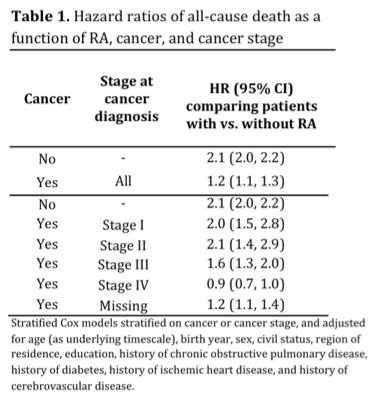Session Information
Title: Epidemiology and Public Health (ACR): Rheumatoid Arthritis and Systemic Lupus Erythematosus Outcomes
Session Type: Abstract Submissions (ACR)
Background/Purpose: Emerging evidence links inflammation and immune-competence to cancer progression and outcome. The few studies addressing cancer survival in the context of systemic inflammation, such as rheumatoid arthritis (RA), have reported reduced survival without accounting for the underlying mortality risk in RA. Whether this increased mortality is a cancer-associated phenomenon, an effect of the decreased lifespan in RA, or a combination of both is unknown.
Methods: Using Swedish register data (2001-2009), we performed a cohort study of individuals with RA (N=34930), matched to general population comparators (N=169740), including cancers (N=12676) and deaths (n=14291). We restricted to adults with no history of malignancy between 40 and 84 years old at start of study. Using multivariable adjusted stratified Cox models we first estimated the overall association between RA and death for those with and without cancer during follow-up using age as the underlying timescale., and then stratified by cancer stage. We then estimated the effect of RA versus non-RA by cancer stage restricting to individuals with an incident cancer during follow-up. We also investigated how the RA effect varied by time since cancer diagnosis (0-2 years, 2-5 years, >5 years since diagnosis) These analyses looked at all-cause mortality for all cancers and specific sites (lung, colorectal, female breast, prostate, malignant melanoma, and lymphoma).
Results: In the absence of cancer, RA was associated with a doubled mortality rate (HR=2.1, 95%CI 2.0-2.2). In the presence of cancer, the effect of RA on mortality was lower (HR=1.2, 95%CI 1.1-1.3), but only for advanced stage cancers. For stages I and II the relative effect of RA on mortality was doubled (HR=2.0 and HR=2.1, respectively). These associations remained across time since cancer diagnosis, and were reasonably similar across sites.
Conclusion: Our results offer limited evidence that RA would potentiate the effect of cancer on the risk of death, at least not in cancers diagnosed at advanced stage. Instead, much of the increase in mortality in RA patients diagnosed with cancer seems to reside with effects of RA independently of the cancer.
Disclosure:
J. Simard,
None;
S. Ekberg,
None;
A. Johansson,
None;
J. Askling,
None.
« Back to 2014 ACR/ARHP Annual Meeting
ACR Meeting Abstracts - https://acrabstracts.org/abstract/what-is-the-impact-of-chronic-systemic-inflammation-such-as-rheumatoid-arthritis-on-mortality-following-cancer/


